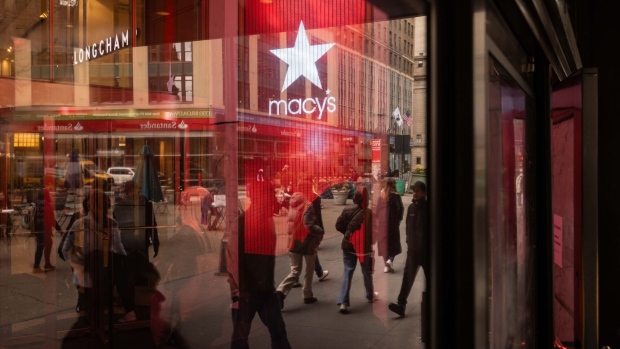Feb 27, 2024
Macy’s to Close 150 Namesake Stores, Grow Luxury Brands
, Bloomberg News

Macy’s Inc. said it plans to close almost a third of its namesake U.S. locations as the department-store chain seeks to fight off a pair of activist firms seeking to buy the company.
The company didn’t give an estimate of the number of employees that will be affected by the closures, though it said in a filing that it would take a US$50 million charge related to employee termination costs. Many of the stores are near other Macy’s locations, which could allow some workers to transfer. Macy’s also plans to add 15 new Bloomingdale’s and 30 Bluemercury locations by 2026 — an effort to accelerate growth of its higher-end brands.
The announcement, accompanied by fourth-quarter results, follows a $5.8 billion buyout offer from Arkhouse Management Co. and Brigade Capital Management in December. Macy’s rejected the offer, but last week Arkhouse nominated nine directors to Macy’s board as the activist investor persists in its efforts.
In a slide presentation released after the results, Macy’s warned that it expects first-quarter earnings of 10 cents to 16 cents a share, far below the consensus estimate of 45 cents compiled by Bloomberg.
The shares rose 3.3 per cent as of 9:33 a.m. in New York. Macy’s shares had declined 4 per cent this year through Monday’s close, compared with a 3.7 per cent rise for the S&P MidCap 400 consumer discretionary index.
Freeing assets
The new real estate strategy, which comes less than a month into the tenure of Chief Executive Officer Tony Spring, is expected to free up between $600 million and $750 million of assets through 2026, the company said.
Fourth-quarter earnings of $2.45 a share, excluding some items, beat the average analyst estimate and improved from a year ago. For the full year, Macy’s anticipates adjusted earnings of $2.45 to $2.85 a share, below the average analyst estimate of $3 and weaker than last year. The company’s net sales outlook was also below the average analyst estimate. Macy’s described 2024 as a year of “transition and investment.”
“The shopper is still under pressure,” said Spring, who had a four-decade career at Bloomingdale’s before taking the helm of its parent company. “Inflation is still up even if it’s not as high as it was. We’re going to have to fight for our fair share and fundamentally reposition the business for growth.”
Same-store sales at the Macy’s namesake brand fell 6 per cent on an owned basis in the fourth quarter, while sales at the higher-end Bloomingdale’s fell 1.5 per cent. Bluemercury, which sells beauty and skin-care products, rose 2.3 per cent. While sales across the company were down from a year earlier, Macy’s beauty and off-price categories performed well during the holiday season.
Long-term shift
Macy’s, like many mall-based retailers, has struggled with a long-term shift in consumer behavior that favors online and off-mall shopping. However, stores still make up the majority of Macy’s business, accounting for about two-thirds of sales, according to Spring.
In 2020, just before the pandemic, Macy’s announced a separate strategy, known as Polaris, which was meant to stabilize profitability and included a plan to close 125 stores. It ultimately closed about 85 stores. The new plan will leave the company with just over half of its pre-pandemic store count.
Of Macy’s total square footage, 25 per cent of it makes up less than 10 per cent of sales, Spring said.
“The math on it is very compelling,” Spring said. “I would say it’s not the quantity of stores, it’s the quality of stores. It’s about having the right stores in the right geographic parts of the country where consumers are still shopping.”
Much of the company’s value is tied up in real estate. It currently operates 481 Macy’s stores, 33 Bloomingdale’s locations and 159 Bluemercury stores across the US. By closing a further 150 Macy’s stores, the company will be able to prioritize investment in the remaining locations and continue to expand small-format, off-mall locations, Macy’s said in a statement.
“The plan to reinvigorate the Macy’s banner is long overdue and the recognition that something needs to change is to be warmly welcomed,” Neil Saunders, analyst at GlobalData Plc, said in a note. “It will be a long, hard slog to stop and reverse all the rot that has infected the Macy’s brand over many, many years.”




